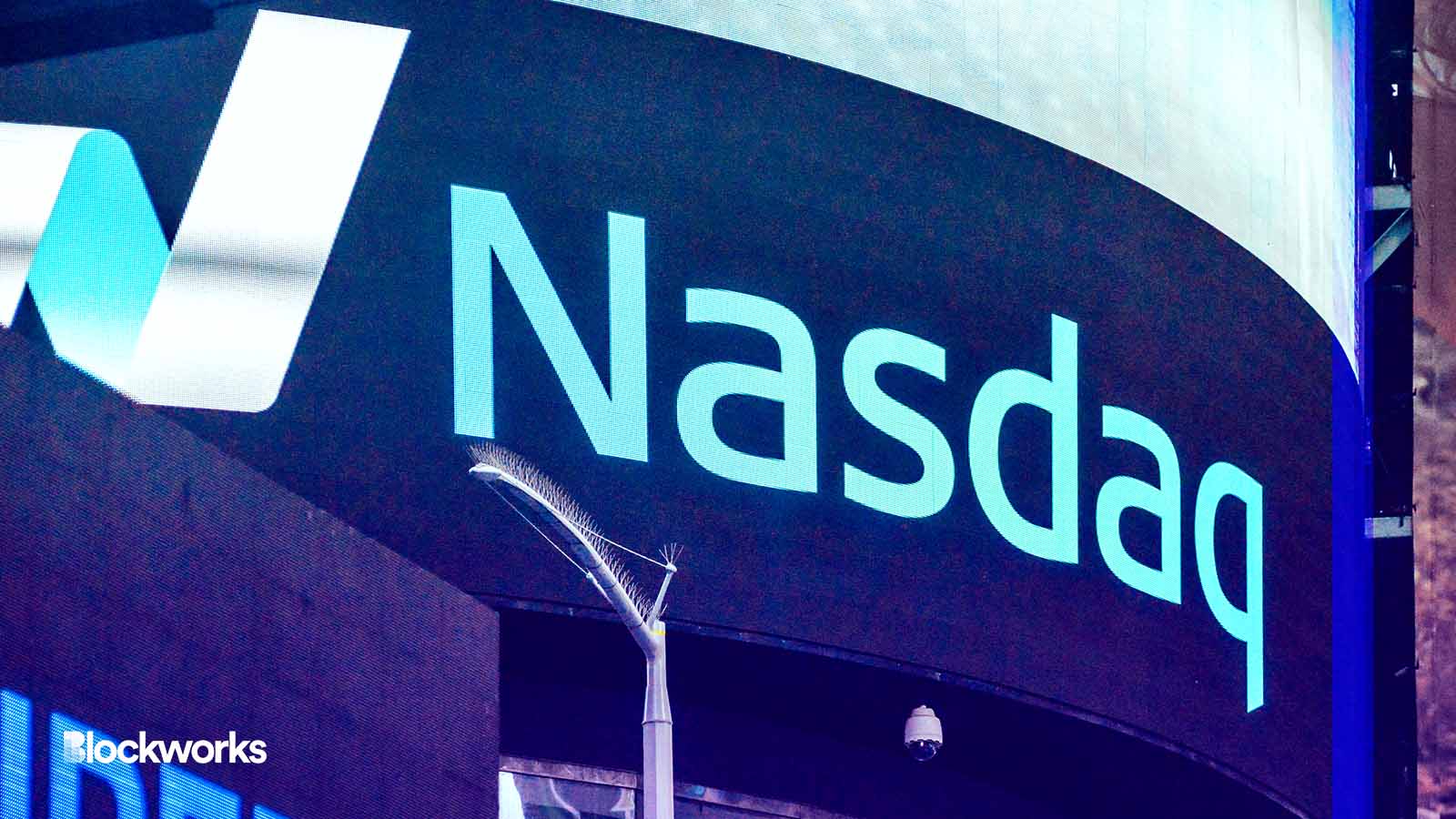Nasdaq says it’s not the ‘right time’ to launch crypto custody business
CEO Adena Friedman said the decision came after the “business opportunity” changed over the past few months

Goran Vrhovac/Shutterstock modified by Blockworks
Nasdaq has pulled the plug on what would have been its biggest and boldest cryptocurrency initiative before it even went live.
The US stock exchange giant’s CEO, Adena Friedman, said during a Wednesday earnings call that Nasdaq will halt plans for a crypto custodian business as it waits to see how the American regulatory landscape evolves.
Friedman said that it wasn’t the “right time” for Nasdaq to pursue a custodial business, citing a “lack of clarity” in the sector.
“We looked at the opportunity set of just being a custodian, nothing else, just that one segment of the business…[the] opportunity changed over the last several months and then the regulatory overlay and kind of overhang changed as well,” she said.
Nasdaq first made public its interest in becoming a crypto custodian last September. In March, Blockworks reported that the stock exchange giant was eyeing a second-quarter launch of its crypto custody suite.
Nasdaq declined to comment further when reached.
The move represents a pivot of sorts, but Nasdaq has indicated it will continue to push for the creation of crypto ETF products, including via its involvement in the growing crop of prospective spot bitcoin ETFs, as well as crypto-centric index products.
Read more: Start your engines: Deadlines to watch for in the bitcoin ETF race
There’s also the question of how Nasdaq has gone about building its custody business to date. Regulatory issues aside, the exchange appears to have been banking, at least in part, on brand-name recognition in the hopes of drawing crypto custodial customers from its existing base of clients and counterparties.
That approach, however, pitted Nasdaq against crypto-native custodial businesses such as Anchorage Digital, which possessed both first-mover advantages and homegrown tech stacks.
In conversations with industry participants, Nasdaq’s strategy was widely viewed as laying the groundwork for it to eventually offer a range of services to institutional crypto asset managers, including trading and execution, which would have created more regulatory complexities.
Bridging crypto and finance
For Nasdaq to pull the plug — at least for now — on an ambitious custodial endeavor is a notable move, given the time and resources spent thus far.
An executive who interviewed with Nasdaq for a role in its crypto custody business told Blockworks earlier this year that the company’s tech stack — as well as its broader hiring pipeline — skewed toward those with traditional finance experience.
The executive, who requested anonymity to discuss a confidential hiring process, pointed to Nasdaq installing Ira Auerbach as president of Nasdaq Digital, its crypto unit, as the main individual on the team that “actually has crypto experience.” Auerbach formerly worked as Gemini’s global head of prime brokerage.
Auerbach in September 2022 wrote that “institutional adoption will accelerate once there are clear rules and regulations for the wide range of activities in the digital asset market.”
“On the product side, I see three major gaps: the security vs. access trade-off between cold and hot wallet key management, the lack of capital efficiencies given the many execution venues for digital assets and the lack of normalized best execution,” he said.
Auerbach, who has also spent time at Palantir, joined Nasdaq in July 2022 to oversee the custodial effort. At the time, Auerbach’s hiring was trumpeted by Nasdaq as one indication that the company would mesh crypto-native approaches with its legacy finance products.
Never say never?
In her remarks, Friedman stressed the company’s commitment to building crypto products and told analysts on the call that she wanted to avoid the word “forever.”
“We remain committed to supporting the evolution of the digital assets ecosystem in a variety of ways among them, to our ongoing engagement with regulators to delivery of comprehensive technology solutions across the trade lifecycle, and through our partnerships with potential ETF issuers to support tradable exchange with the products,” Friedman said.
Friedman cited the exchange’s partnerships with potential spot bitcoin ETF issuers as part of its ongoing focus in the digital asset space. For example, Nasdaq is BlackRock’s listing exchange for its proposed spot bitcoin ETF, which the asset manager announced in June.
As for what’s next, Friedman said Nasdaq would “likely” add to the digital assets business “in connection with other things you might want to try to do in the digital asset space.” So, for now, Nasdaq plans to settle as a “great technology provider” for its clients.
Yet by Nasdaq’s own telling, moves by US regulators have left long-established crypto companies on the defensive and stifled would-be startups throughout the sector. The SEC has open lawsuits against a number of crypto companies currently, including Coinbase and Binance.
Industry participants have said regulatory uncertainty has made it increasingly difficult for companies to launch custodian services for digital assets.
Get the news in your inbox. Explore Blockworks newsletters:
- The Breakdown: Decoding crypto and the markets. Daily.
- 0xResearch: Alpha in your inbox. Think like an analyst.






